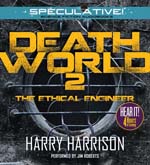
 Deathworld 2: The Ethical Engineer
Deathworld 2: The Ethical Engineer
By Harry Harrison; Performed by Jim Roberts
Publisher: Brilliance Audio4 hours [UNABRIDGED]
Themes: / gambler / psionic abilities / planetary worlds / planetary colonists / slavery /
Publisher summary:
In the first Deathworld, wily interstellar gambler Jason dinAlt managed to survive on Pyrrus, a planet that seemed to be at war with its own people. He also stopped a deadly feud between two groups of those people. In the second volume of this trilogy, Jason finds that keeping the peace is even more difficult than ending the war. He is also becoming increasingly annoyed with the superior attitude of the natives, including his girlfriend, and this leads to his taking a very big chance. He allows himself to be arrested and taken away from the planet to show that he can take care of himself. He soon regrets that decision after crashing on a planet where the people are quite primitive and he is made a slave. Now he just wants to escape and get back to Pyrrus, but finds that it takes all his cunning and physical prowess just to stay alive. Harry Harrison gives us another fast-paced yet surprisingly thought-provoking story in Deathword 2: The Ethical Engineer.
Deathworld 2: The Ethical Engineer is the second in Harry Harrison’s Deathworld trilogy, which follows the interplanetary adventures of professional gambler Jason din’Alt. Although the plot picks up pretty soon after the first book left off, it doesn’t feel like a sequel as much as an interlude from the Pyrran saga. There is very little to link the two books other than the presence of the protagonist who is immediately taken off world away from the characters of the first book. However, the story itself is full of pulp fiction-y goodness and centers on a brand new, slightly less deadly world. A primitive world that seems to have regressed since it’s initial colonization, a majority of the people are slaves to brutal tribal chiefs who lead a never ending search for food in a barren wasteland. The more powerful chiefs, as uneducated and greedy as their people, each own one aspect of the technology that remains from more advanced times. But their refusal to work together has left the world with limited resources and a stagnated intelligence. A possible commentary on the dangers of rigid corporatism, the world structure explores a backward approach to invention that deconstructs advanced ideas into their most rudimentary parts, much to their detriment.
This sort of simplistic, one-dimensional thinking also plays into Jason’s new antagonist Mikah who is a member of some sort of universal police force that imposes a very strict moral code on everyone around them. He sees life in perfectly defined right and wrongs with no room for the moral relativism Jason is so fond of indulging in. Initially arresting Jason because of his gambling, he spends most of the book in mortal danger due to his refusal to bend his moral code and frequently hampers Jason’s attempts to rescue him for the same reason. His frustrating behavior quickly makes Mikah into one of the most annoying characters ever conceived and I spent most of the book wishing Jason would just leave him behind. In most respects, Mikah acts like a robot with no capacity to learn, change, develop, or understand anything not in his original programming, so that even though he is ideologically opposed to Jason, he’s not a very interesting adversary.
Jason, on the other hand, actually manages to both develop and regress in this book. In addition to a knowledge of gambling and weapons and his psionic powers (none of which he uses in this story), we find out he is rather conveniently a skilled mechanic and electrician. Unlike this last book, he actually has a good reason to be entangled in this plot since it was a consequence of his lifestyle choices but by ignoring his psionic powers which were so vastly important before, he was become a more generic character. This isn’t helped by the fact that exposure to the morally upright Mikah has no more effect of him than he does on Mikah. In the end, nothing has really changed except for the bloody wars he probably will have left behind him.
As far as the audio goes, it is the same wooden narrator as the first book and so not one I would recommend. But overall, it’s the kind of enjoyable light reading meant for a rainy afternoon and is short enough that it won’t take you much longer.
Posted by Rose D.